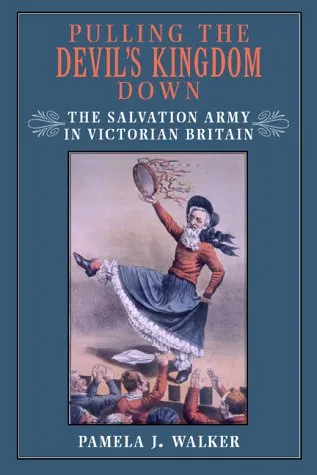Pulling the Devil's Kingdom Down: The Salvation Army in Victorian Britain
4.5
Reviews from our users

You Can Ask your questions from this book's AI after Login
Each download or ask from book AI costs 2 points. To earn more free points, please visit the Points Guide Page and complete some valuable actions.Related Refrences:
Introduction
Welcome to an in-depth exploration of "Pulling the Devil's Kingdom Down: The Salvation Army in Victorian Britain" by Pamela J. Walker. This book delves into the rich history of the Salvation Army, a movement that played a substantial role in the spiritual and social landscape of Victorian Britain. Through this lens, we gain insight into the transformational power of faith and its impact on society.
Detailed Summary of the Book
"Pulling the Devil's Kingdom Down" offers an intricate portrait of the Salvation Army's development and influence during the Victorian era. Pamela J. Walker meticulously traces the origins of the movement, founded by William and Catherine Booth in 1865, and its rapid growth as it endeavored to bring Christianity to the poorest urban populations. She illustrates how the Army's methods, including street preaching, lively music, and a quasi-military structure, were both innovative and controversial. These strategies helped the organization stand out in a crowded philanthropic market.
The book also explores the internal dynamics of the Salvation Army, examining its leadership style and the role of gender within the organization. Walker pays particular attention to the significant, yet often under-recognized, contributions of women leaders who played a pivotal role in the Army's expansion. By highlighting such stories, Walker not only chronicles the Salvation Army's history but also provides a narrative of empowerment and advocacy for women's leadership.
Throughout the narrative, Walker undertakes a nuanced analysis of the tensions between the spiritual mission of the Salvation Army and its social activism. Readers are invited to consider the complex interplay of religion, society, and culture in shaping the Army's mission and legacy.
Key Takeaways
- The Salvation Army was a revolutionary movement that combined religious fervor with social activism, challenging both societal norms and religious conventions of the time.
- Walker emphasizes the role of women in leadership positions within the Salvation Army, shedding light on the gender dynamics of the period.
- The organization's innovative use of music, uniforms, and military hierarchy significantly contributed to its widespread impact and recognition.
- The book provides insight into the broader contexts of Victorian society, including class struggles and the urban poor's challenges.
Famous Quotes from the Book
"The uniform, the music, and the banners were not mere symbols they were the language of rebellion against the traditional church and the social order it represented."
"The Army's strength lay in its ability to disrupt the ordinary routines of urban life, calling attention to the plight of the poor and godless."
Why This Book Matters
The significance of "Pulling the Devil's Kingdom Down" lies in its ability to articulate a comprehensive and compelling narrative of one of the most unique religious movements in history. Pamela J. Walker provides readers an opportunity to engage with a pivotal moment in religious and social history, offering crucial lessons on the power of community and commitment to social justice.
This book matters not only to historians and scholars of religious studies but also to anyone interested in social reform movements and the role of faith in driving societal change. It serves as a testament to the enduring impact of the Salvation Army and an inspiration for modern social justice efforts.
Free Direct Download
You Can Download this book after Login
Accessing books through legal platforms and public libraries not only supports the rights of authors and publishers but also contributes to the sustainability of reading culture. Before downloading, please take a moment to consider these options.
Find this book on other platforms:
WorldCat helps you find books in libraries worldwide.
See ratings, reviews, and discussions on Goodreads.
Find and buy rare or used books on AbeBooks.



